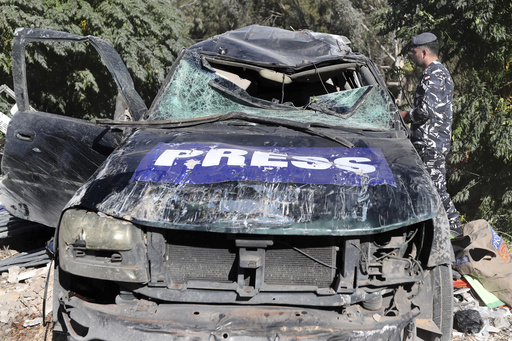
BEIRUT — In the early hours of Friday, an Israeli airstrike in southeast Lebanon resulted in the tragic deaths of three journalists who were asleep in a guesthouse. This area had largely remained untouched by the escalating conflicts that have plagued the surrounding regions. The incident marks a continuation of a distressing pattern of assaults on journalists reporting on the ongoing war in Gaza and Lebanon over the past year.
The airstrike occurred around 3 a.m., completely destroying the guesthouse, which had been occupied by reporters from multiple media organizations. Evidence of the strike was visible, with vehicles clearly marked “PRESS” overturned and buried under rubble. The Israeli military did not provide a pre-strike warning and later stated that the situation was being reviewed.
The deceased included Ghassan Najjar, a camera operator, and Mohammed Rida, a broadcast technician, both from Al-Mayadeen TV, as well as Wissam Qassim, a camera operator for Hezbollah’s Al-Manar TV. This strike followed another earlier in the week that targeted an Al-Mayadeen office located in the southern suburbs of Beirut. Both media outlets are known for their pro-Hezbollah stance, influenced by Iran.
The attack in the Hasbaya region, which had previously avoided Israel’s aggressive strikes, drew strong backlash from various officials, journalists, and press advocacy organizations. Many reporters had relocated to Hasbaya, believing it to be a safer location subsequent to an evacuation order issued by Israel for towns further south.
Elsy Moufarrej, the coordinator for the Alternative Press Syndicate in Lebanon, voiced concerns regarding the targeted nature of the attack, suggesting it was intended to force journalists out of southern Lebanon and prevent them from documenting the unfolding events. Lebanese Information Minister Ziad Makary described the killings as a deliberate act, noting that more than a dozen journalists were present at the guesthouse at the time of the bombing.
“I believe this is an assassination, executed with prior planning and surveillance,” Makary stated on social media. Imran Khan, a senior correspondent for Al Jazeera English, affirmed that no warnings preceded the attack and described the harrowing scene where journalists had come to rest after extensive days of coverage.
Hussein Hoteit, a cameraman for Al-Qahira TV, recounted his narrow escape from the rubble after being trapped during the attack, indicating he did not hear the missiles explode but was ultimately rescued by colleagues.
The incident marks just another chapter in the ongoing toll on journalists in the region, with the Committee to Protect Journalists reporting that at least 128 media personnel have been killed in Gaza and Lebanon over the past year—an alarming number resulting principally from Israeli actions. They noted that this figure represents the highest annual casualty rate for journalists recorded since they began documenting these tragedies in 1992.
Press advocacy organizations and United Nations experts have expressed indignation over these attacks, despite Israeli officials claiming they do not intentionally target journalists. Lebanon’s Health Minister added that so far, 11 journalists have lost their lives, and eight have been injured due to Israeli fire in Lebanon within the past year.
Recent events have underscored a troubling trend, including incidents that saw journalists from major networks killed or injured as they reported from conflict zones. Israeli officials recently asserted that journalists at Al Jazeera were affiliated with militant groups, a claim that has been denied as unfounded by the network and dismissed by the Committee to Protect Journalists as lacking evidence.
Jad Shahrour, a representative for a media freedom organization, articulated concern over what he termed an intentional effort to suppress the truth through such bombings. He warned that this trend seems to be spilling over from Gaza into Lebanon, suggesting a broader denial of media access and coverage.
The director of Al-Mayadeen, Ghassan bin Jiddo, condemned the airstrike as a calculated attack specifically targeting journalists reporting on Israeli military actions. Meanwhile, prominent correspondent Ali Shoeib from Al-Manar lamented the irony of their situation, stating that while they aimed to report the news, they have now become victims of the ongoing conflict, illustrating the perilous environment journalists face in the region.
